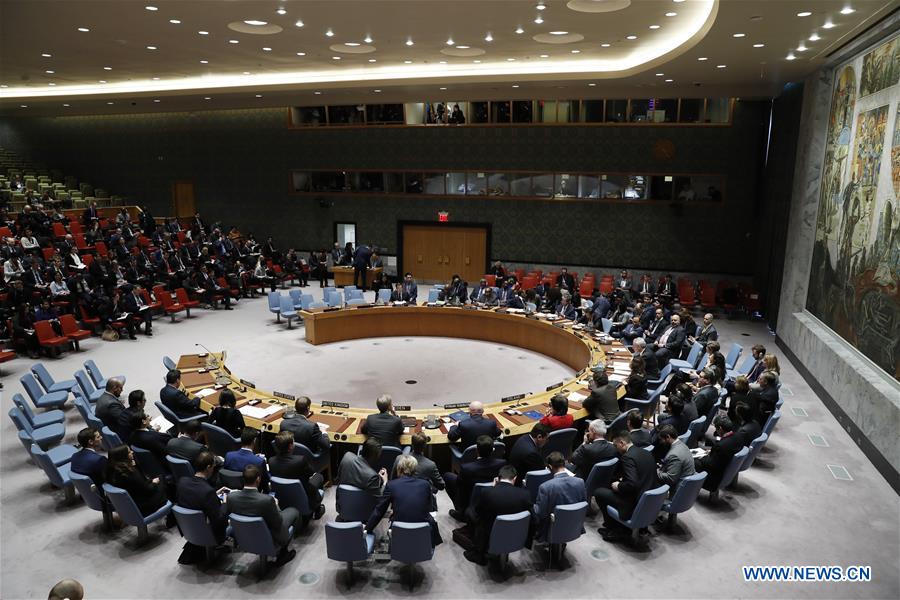Video PlayerClose

Photo taken on March 14, 2018 shows a general view of United Nations Security Council's meeting on the poisoning of a former Russian spy in Britain at the UN headquarters in New York. UN Secretary-General Antonio Guterres on Wednesday condemned the alleged use of nerve agent in the poisoning of a former Russian spy in Britain. Sergei Skripal, a 66-year-old former Russian spy who became a double agent for Britain, and his 33-year-old daughter Yulia were found unconscious on a bench outside a shopping center in the southern English city of Salisbury on March 4. They remain in a critical condition. British authorities have concluded that the two were poisoned with the nerve agent Novichok. London has demanded Moscow explain why the nerve agent that traces back to Russia should end up in Britain. (Xinhua/Li Muzi)
LONDON/MOSCOW, March 16 (Xinhua) -- The spy poisoning row between Britain and Russia escalated after some major Western countries recently blamed Russia for a chemical attack on a former Russian spy, a charge Russia has denied.
The leaders of Britain, France, Germany and the United States condemned the murder attempt in a joint statement on Thursday, saying "We, the leaders of France, Germany, the United States and the United Kingdom, abhor the attack that took place against Sergei and Yulia Skripal in Salisbury, UK, on March 4, 2018."
North Atlantic Treaty Organization (NATO) Secretary General Jens Stoltenberg on the same day expressed the Allies' support for Britain and called on Moscow to address London's questions about the incident.
However, the Russian government has denied any involvement in the attack.
Russian Foreign Minister Sergei Lavrov said on Tuesday in a press conference in Moscow that Russia was ready to cooperate with Britain in the investigation of the incident in accordance with international law.
"Russia is innocent and Russia is ready to cooperate in accordance with the Chemical Weapons Convention if the United Kingdom condescends to honoring its international legal obligations related to the mentioned document," Lavrov said.
British Prime Minister Theresa May on Wednesday announced a series of measures against Russia over its failure to respond to demands by the British government to explain the poisoning incident.
These measures included the expulsion of 23 Russian diplomats in a week, the freezing of Russian state assets in Britain, the suspension of all planned high-level bilateral contacts and a boycott by ministers and the Royal Family to attend the FIFA World Cup in Russia.
Besides the sanctions imposed by Britain, Washington on Thursday also announced more sanctions on Russia for its alleged interference in the 2016 U.S. election and "malicious" cyber attacks, which may make things worse for Moscow.
Earlier on Thursday, Russian Foreign Ministry spokeswoman Maria Zakharova said London's accusations were "completely insane," adding that "reciprocal steps" would be taken in the near future in response to London's retaliations, including suspending all planned high-level bilateral contacts.
On Thursday afternoon, the Geneva-based Conference on Disarmament heard an update by Britain on the poisoning in Salisbury in which Britain said a military-grade nerve agent Novichok developed by Russia had been used.
"The United Kingdom had concluded that the Russian State was involved, and had taken adequate measures, which were not directed against the people of Russia but were in objection to reckless acts of its Government," a British representative said.
Russia in response urged Britain to provide concrete evidence and facts on which it was basing its accusations.
Denying Russia's involvement in the poisoning, a Russian representative said that this issue should be discussed in a different forum and remarked that its requests to Britain for information-sharing remained unanswered.
The London-Moscow row started following the murder attempt on former Russian double agent Sergei Skripal and his daughter Yulia in Britain's southwestern city of Salisbury, which took place on March 4.
Britain claims the father-daughter pair was exposed to a nerve agent called Novichok and Russia is responsible for the act, a charge which Moscow denies.
